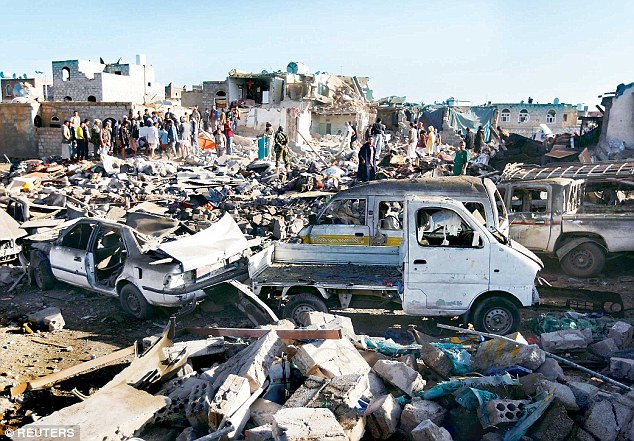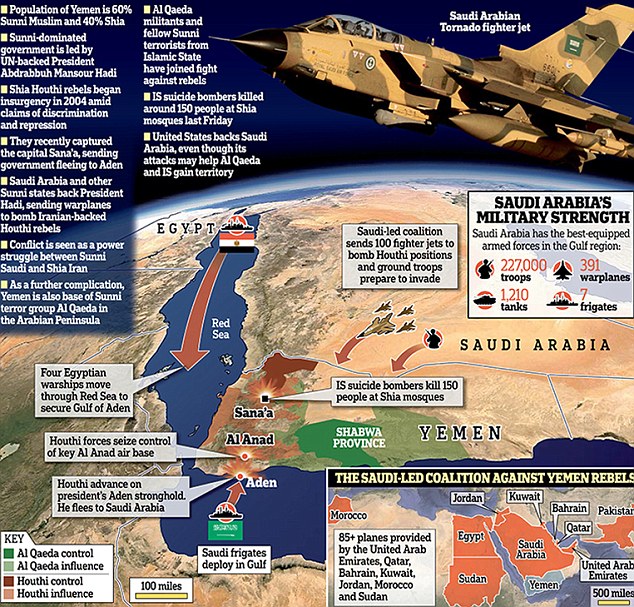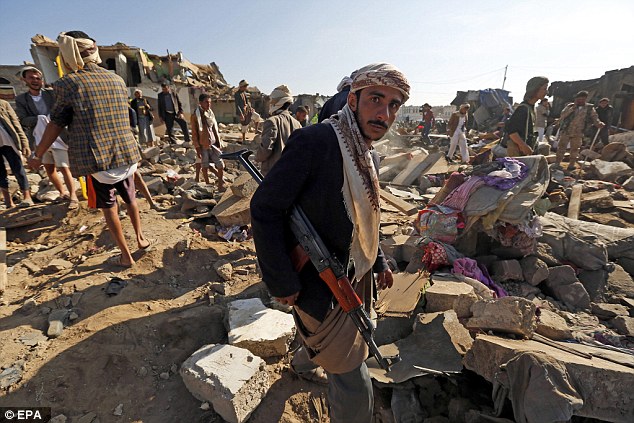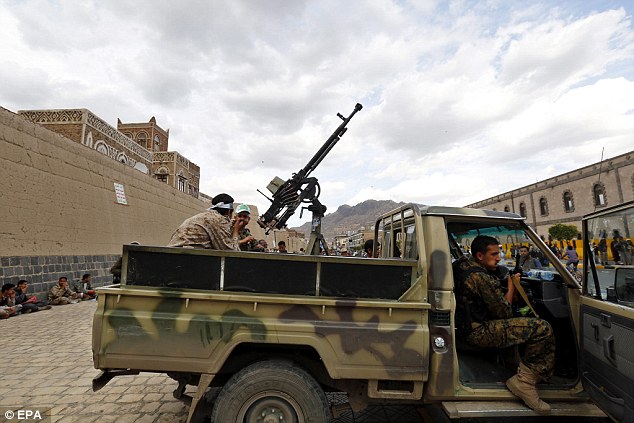BLACKEAGLE
SENIOR MEMBER
By Michael Burleigh for the Daily Mail
Published: 23:36 GMT, 26 March 2015 | Updated: 08:01 GMT, 27 March 2015
Truly, it is a terrifying development. The great religious fissure between Sunni and Shia Muslims that dominates the Middle East has erupted into open conflict in Yemen, the region’s poorest country, threatening to engulf the entire area in a wider war.
In a dramatic escalation of the stakes, a Sunni coalition of Arab states led by Saudi Arabia launched airstrikes against Iran-backed Shia Houthi rebels who have swept south through the country.
As Yemen veered towards political disintegration, the conflict exploded into a region-wide crisis that could have far-reaching and unpredictable international consequences.

Saudi Arabia launched airstrikes against Iran-backed Shia Houthi rebels, pictured people gather at the site of an explosion near Sana'a Airport
Brent crude oil prices increased by 6 per cent, for example, since many of the world’s oil shipments pass through or past the Bab el-Mandab Strait linking the Red Sea with the Gulf of Aden.
But the far more pressing concern is whether we are now seeing a proxy war in Yemen between its neighbour Saudi Arabia, the leading Sunni power, and Iran, the leading Shia power, explode into a regional conflict that could sweep us all up in its wake.
Saudi warplanes targeted Houthi positions in the country’s capital Sana’a killing 18 civilians and injuring many more.
Britain and America supported the Saudi-led military intervention in Yemen as the coalition deployed 100 fighter jets and amassed 150,000 soldiers to fight in the region.
Another nine Sunni states joined the offensive, including the United Arab Emirates, Kuwait and Qatar, pledging to send aircraft to bomb targets, with Egypt deploying ships.
Anticipating the worsening situation, British elite soldiers — in Yemen to train government troops to fight Al Qaeda, which has established its most dangerous branch in the country — pulled out last Friday.

This followed a decision by the U .S. to evacuate their remaining military personnel as the country teetered on the brink of civil war between the internationally recognised government of President Abdrabbuh Mansour Hadi and the Houthi rebels.
As Western forces left, the rebels — trained, armed and funded by Iran — made further advances in the south of the country.
The Yemeni president, who is backed by the U.N., was forced to flee his palace in the former British colonial port of Aden on the southern coast and there were reports last night that he had left by boat for the Saudi capital, Riyadh. This week, Aden — once one of the British Empire’s most important ports for ships heading to imperial India, and a haven of stability patrolled by officers in pith helmets and colonial shorts — was raked with the sound of gunfire.
Just 35 miles to the north, Shia rebels had seized Al Anad air base, which until recently had been used by American counter-terrorism forces to fight terrorists.
Yemen sits on the extreme end of the Arabian peninsula, with Saudi Arabia to the north — where the 150,000 Saudi troops are now amassing on its border.

An armed member of Houthi militia stands over the rubble of houses which were allegedly destroyed by a Saudi air strike in Sana'a, Yemen
A fierce, tribal society, Yemen has long been torn apart by tribal conflicts. Governing the country has been compared with dancing on the heads of snakes.
The Houthis — who belong to a relatively obscure branch of Shia Islam — were largely confined to the north of the country and were contained by the country’s longtime president, Ali Abdullah Saleh, a wily Arab strongman, until he was overthrown in the course of the Arab Spring in 2011. President Hadi, his weaker successor, never managed to reassert central control, and in September the Houthis took control of the capital Sana’a.
In the vacuum created by President Hadi’s weak leadership, Iran saw the opportunity to taunt its old rival by backing the Houthis and establishing its influence in the Saudis’ backyard.
But the recent Houthi advances have proved too much for Saudi, whose primary aim is to re-establish order in Yemen. It amassed a formidable coalition — Egypt, Jordan, Sudan, Morocco, Pakistan, United Arab Emirates, Qatar, Kuwait and Egypt — of Sunni-led states and sent in its fighter jets to send a powerful message to Iran: stop meddling in Arab affairs.
The Saudis also regard Iran’s influence in Yemen as evidence of a much larger drive by Shia Iran for regional dominance.
They claim that Iran is using armed proxies to take over other states. Nothing happens in Lebanon, for instance, without the approval of the Iranian-backed Shia militia Hizbollah, which also provides Syria’s beleaguered President Assad with his light infantry.

Houthi fighters manning a heavy machine gun fixed on the back of a pick-up guard a rally protesting Saudi-led airstrikes
For its part, Iran has condemned the air strikes. Foreign Ministry spokeswoman Marzieh Afkham said the country ‘considers this action a dangerous step’, adding that military action would complicate and worsen the crisis in Yemen. ‘This invasion will bear no result but expansion of terrorism and extremism throughout the whole region,’ she said.
And the truth is that she may well be right. Yemen has a chronic terrorism problem, simply because such a failed state is an ideal operating ground for terrorists.
Yemen is not only home to the most tactically lethal branch of Al Qaeda but now ISIS has a foothold there too. On March 20 four ISIS suicide bombers killed 137 Shia outside their mosques in Sana’a.
Before the U.S. military moved out of the country, they were allowed to launch drone strikes on Al Qaeda. But now, in their absence, terrorists are no longer being targeted so effectively, and will only flourish as a result.
To make matters still more precarious for the West in its fight against terror, Iran and the Shia militias it backs are proving an increasingly vital component of the ground war against ISIS in Iraq, with Iranian commanders directing them and supplying them too.
This means the West is walking on diplomatic eggshells. What if Iran took over much of Iraq, whose government and population is largely Shia as well? Would the Saudis stand for that?
And if a Shia Houthi government succeeds in Yemen, then wouldn’t Saudi Arabia’s own downtrodden Shia population, some 10-15 per cent of them in the kingdom’s oil-rich Eastern Province, want some independence?
The western response to this chaos is understandably hesitant. Washington is unsure whether Iranian strategy is really to establish proxy Shia governments all over the region or simply to use the Houthi in Yemen to taunt Saudi Arabia and pacify the country’s own hardliners.
We now have a bizarre — and potentially very dangerous — situation in which U.S. warplanes are providing air cover for Iranian-backed militias in Iraq in a joint effort against ISIS, while 1,200 miles to the south in Yemen, the Americans are helping Saudi pilots bomb Shia insurgents supported by Iran.
So the U.S. is bombing Iran’s enemies in one country, while helping to bomb its allies in another.
On top of all this, American and Iranian diplomats are resuming their talks about how to restrain Tehran’s nuclear programme.
Such is the chaotic and complex nature of affairs in the Middle East. And as the Saudis pledge to resolve their own local difficulty, we can only hold our breath.
Saudi Arabia sends war planes into Yemen in a terrifying clash with Iran | Daily Mail Online
Published: 23:36 GMT, 26 March 2015 | Updated: 08:01 GMT, 27 March 2015
Truly, it is a terrifying development. The great religious fissure between Sunni and Shia Muslims that dominates the Middle East has erupted into open conflict in Yemen, the region’s poorest country, threatening to engulf the entire area in a wider war.
In a dramatic escalation of the stakes, a Sunni coalition of Arab states led by Saudi Arabia launched airstrikes against Iran-backed Shia Houthi rebels who have swept south through the country.
As Yemen veered towards political disintegration, the conflict exploded into a region-wide crisis that could have far-reaching and unpredictable international consequences.

Saudi Arabia launched airstrikes against Iran-backed Shia Houthi rebels, pictured people gather at the site of an explosion near Sana'a Airport
Brent crude oil prices increased by 6 per cent, for example, since many of the world’s oil shipments pass through or past the Bab el-Mandab Strait linking the Red Sea with the Gulf of Aden.
But the far more pressing concern is whether we are now seeing a proxy war in Yemen between its neighbour Saudi Arabia, the leading Sunni power, and Iran, the leading Shia power, explode into a regional conflict that could sweep us all up in its wake.
Saudi warplanes targeted Houthi positions in the country’s capital Sana’a killing 18 civilians and injuring many more.
Britain and America supported the Saudi-led military intervention in Yemen as the coalition deployed 100 fighter jets and amassed 150,000 soldiers to fight in the region.
Another nine Sunni states joined the offensive, including the United Arab Emirates, Kuwait and Qatar, pledging to send aircraft to bomb targets, with Egypt deploying ships.
Anticipating the worsening situation, British elite soldiers — in Yemen to train government troops to fight Al Qaeda, which has established its most dangerous branch in the country — pulled out last Friday.

This followed a decision by the U .S. to evacuate their remaining military personnel as the country teetered on the brink of civil war between the internationally recognised government of President Abdrabbuh Mansour Hadi and the Houthi rebels.
As Western forces left, the rebels — trained, armed and funded by Iran — made further advances in the south of the country.
The Yemeni president, who is backed by the U.N., was forced to flee his palace in the former British colonial port of Aden on the southern coast and there were reports last night that he had left by boat for the Saudi capital, Riyadh. This week, Aden — once one of the British Empire’s most important ports for ships heading to imperial India, and a haven of stability patrolled by officers in pith helmets and colonial shorts — was raked with the sound of gunfire.
Just 35 miles to the north, Shia rebels had seized Al Anad air base, which until recently had been used by American counter-terrorism forces to fight terrorists.
Yemen sits on the extreme end of the Arabian peninsula, with Saudi Arabia to the north — where the 150,000 Saudi troops are now amassing on its border.

An armed member of Houthi militia stands over the rubble of houses which were allegedly destroyed by a Saudi air strike in Sana'a, Yemen
A fierce, tribal society, Yemen has long been torn apart by tribal conflicts. Governing the country has been compared with dancing on the heads of snakes.
The Houthis — who belong to a relatively obscure branch of Shia Islam — were largely confined to the north of the country and were contained by the country’s longtime president, Ali Abdullah Saleh, a wily Arab strongman, until he was overthrown in the course of the Arab Spring in 2011. President Hadi, his weaker successor, never managed to reassert central control, and in September the Houthis took control of the capital Sana’a.
In the vacuum created by President Hadi’s weak leadership, Iran saw the opportunity to taunt its old rival by backing the Houthis and establishing its influence in the Saudis’ backyard.
But the recent Houthi advances have proved too much for Saudi, whose primary aim is to re-establish order in Yemen. It amassed a formidable coalition — Egypt, Jordan, Sudan, Morocco, Pakistan, United Arab Emirates, Qatar, Kuwait and Egypt — of Sunni-led states and sent in its fighter jets to send a powerful message to Iran: stop meddling in Arab affairs.
The Saudis also regard Iran’s influence in Yemen as evidence of a much larger drive by Shia Iran for regional dominance.
They claim that Iran is using armed proxies to take over other states. Nothing happens in Lebanon, for instance, without the approval of the Iranian-backed Shia militia Hizbollah, which also provides Syria’s beleaguered President Assad with his light infantry.

Houthi fighters manning a heavy machine gun fixed on the back of a pick-up guard a rally protesting Saudi-led airstrikes
For its part, Iran has condemned the air strikes. Foreign Ministry spokeswoman Marzieh Afkham said the country ‘considers this action a dangerous step’, adding that military action would complicate and worsen the crisis in Yemen. ‘This invasion will bear no result but expansion of terrorism and extremism throughout the whole region,’ she said.
And the truth is that she may well be right. Yemen has a chronic terrorism problem, simply because such a failed state is an ideal operating ground for terrorists.
Yemen is not only home to the most tactically lethal branch of Al Qaeda but now ISIS has a foothold there too. On March 20 four ISIS suicide bombers killed 137 Shia outside their mosques in Sana’a.
Before the U.S. military moved out of the country, they were allowed to launch drone strikes on Al Qaeda. But now, in their absence, terrorists are no longer being targeted so effectively, and will only flourish as a result.
To make matters still more precarious for the West in its fight against terror, Iran and the Shia militias it backs are proving an increasingly vital component of the ground war against ISIS in Iraq, with Iranian commanders directing them and supplying them too.
This means the West is walking on diplomatic eggshells. What if Iran took over much of Iraq, whose government and population is largely Shia as well? Would the Saudis stand for that?
And if a Shia Houthi government succeeds in Yemen, then wouldn’t Saudi Arabia’s own downtrodden Shia population, some 10-15 per cent of them in the kingdom’s oil-rich Eastern Province, want some independence?
The western response to this chaos is understandably hesitant. Washington is unsure whether Iranian strategy is really to establish proxy Shia governments all over the region or simply to use the Houthi in Yemen to taunt Saudi Arabia and pacify the country’s own hardliners.
We now have a bizarre — and potentially very dangerous — situation in which U.S. warplanes are providing air cover for Iranian-backed militias in Iraq in a joint effort against ISIS, while 1,200 miles to the south in Yemen, the Americans are helping Saudi pilots bomb Shia insurgents supported by Iran.
So the U.S. is bombing Iran’s enemies in one country, while helping to bomb its allies in another.
On top of all this, American and Iranian diplomats are resuming their talks about how to restrain Tehran’s nuclear programme.
Such is the chaotic and complex nature of affairs in the Middle East. And as the Saudis pledge to resolve their own local difficulty, we can only hold our breath.
Saudi Arabia sends war planes into Yemen in a terrifying clash with Iran | Daily Mail Online
